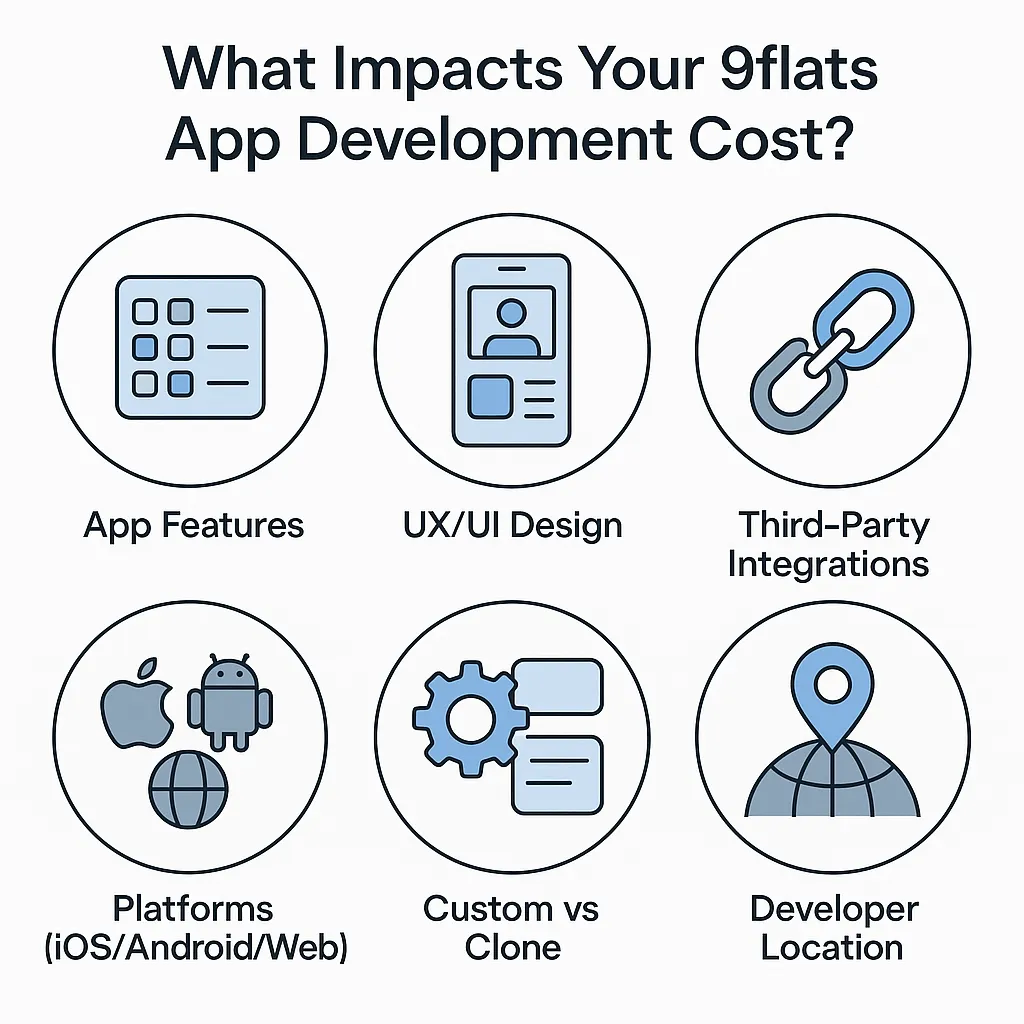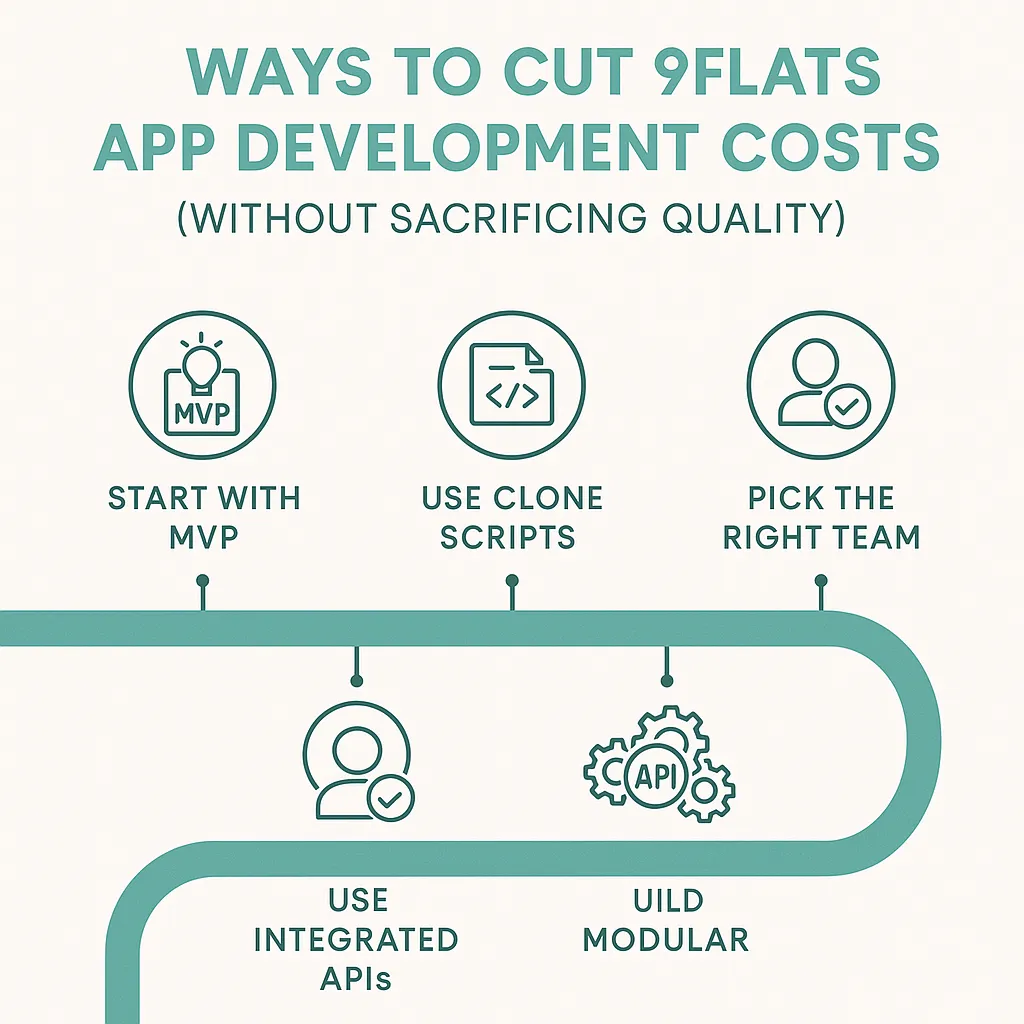9flats App Development Cost in 2026 | Full Pricing Guide
Create a powerful, customizable streaming solution with Miracuves’ 9flats, equipped with high-performance features and next-gen technology.
Thinking of launching a vacation rental platform like 9flats? Before diving into features, design, or monetization strategies, one key question matters most:
What does it cost to build an app like 9flats?
A 9flats-style app goes beyond simple listings. It requires robust booking engines, calendar syncing, secure payments, user profiles, host dashboards, and review systems. Whether you’re building for a local market or aiming to compete globally, understanding the development landscape — including available 9flats clone solutions can help you compare approaches and plan more effectively.
In this guide, we’ll break down the real cost of developing a 9flats clone — including what drives pricing, regional differences, complexity tiers, and ways to stay on budget without cutting corners.

Key Factors That Influence Clone App Development Cost
There’s no single price tag for building a vacation rental app like 9flats. Your final cost depends on the features you prioritize, the tech stack you use, and who builds it.
Here’s what has the biggest impact:
Core Features & Booking Logic → Availability calendars, guest-host messaging, dynamic pricing, and multi-language support increase dev time and complexity.
UX/UI Design → Travel apps need intuitive, mobile-first interfaces to build trust and drive conversions.
Third-Party Integrations → Payment gateways, maps, calendar sync, email/SMS alerts, and fraud detection add both cost and compliance.
Platform Coverage → iOS, Android, and Web versions increase time, testing, and cross-platform support needs.
Customization vs Clone Use → Clone scripts cost less upfront but may require rework. Custom builds are flexible but more expensive.
Scalable Infrastructure → If you plan to host thousands of listings or international users, a cloud-native backend is a must.
Developer Location → Hiring in India or Eastern Europe can significantly reduce hourly rates while maintaining quality.
9flats App Development Cost by App Complexity
To give you a clearer picture, here’s a breakdown of average development costs based on how advanced your 9flats-style app needs to be.
This includes design, development, QA, and initial support — excluding marketing or cloud expenses.
|
App Type
|
Estimated Cost Range (USD)
|
Description
|
|---|---|---|
|
MVP (Minimum Viable Product)
|
$12,000 – $25,000
|
Basic matching, user registration, profiles, messaging, and swipe functionality
|
|
Standard Version
|
$25,000 – $60,000
|
Add premium filters, likes, push notifications, social logins, geolocation features
|
|
Full-Featured App
|
$60,000 – $120,000+
|
Includes video/audio chat, AI recommendations, subscriptions, analytics, admin panel
|
Note: Infrastructure, licensing, and marketing are separate budget lines.
Want a scalable build? Miracuves helps you grow from MVP to full-fledged global rental app — without starting from scratch.
Average Cost Estimates by Region
Developer rates vary drastically depending on geography. Here’s what you can expect for building a 9flats-like app across major outsourcing hubs:
|
Region
|
Hourly Rate (USD)
|
Typical Cost for Standard App
|
|---|---|---|
|
North America
|
$100 – $200/hr
|
$100,000 – $200,000+
|
|
Western Europe
|
$80 – $150/hr
|
$80,000 – $160,000+
|
|
Eastern Europe
|
$40 – $80/hr
|
$40,000 – $90,000+
|
|
India & Southeast Asia
|
$20 – $50/hr
|
$20,000 – $60,000+
|
If you’re looking to control costs without sacrificing quality, experienced offshore partners can offer strong value.
Cost Breakdown by Development Stage : 9Flats Clone
To better understand where your money goes when building a 9Flats clone, it helps to break down the development process by stages. Each phase contributes to the final product and has its own cost implications.
Here’s a typical cost distribution:
|
Development Stage
|
Estimated % of Total Cost
|
Includes
|
|---|---|---|
|
Discovery & Planning
|
5–10%
|
Market research, competitor analysis, defining user personas, feature scoping, technical requirements.
|
|
UI/UX Design
|
10–15%
|
Wireframing, prototyping, responsive design, visual branding, user experience mapping.
|
|
Frontend & Backend Dev
|
40–50%
|
Core feature development, database architecture, APIs, payment integrations, dashboard and logic build.
|
|
Testing & QA
|
10–15%
|
Manual and automated testing, bug fixing, device/browser compatibility checks, performance tuning.
|
|
Deployment & Launch
|
5–10%
|
App store submission (Android/iOS), server setup, production deployment, performance monitoring tools.
|
|
Maintenance & Updates
|
10–20%
|
Post-launch bug fixes, new features, server maintenance, user support, compliance updates.
|

How to Reduce 9flats App Development Costs (Without Compromising Quality)
You don’t have to overspend to build a solid rental platform. Here’s how to optimize your budget the smart way:
Start lean with an MVP → Validate your core booking engine and host flow before scaling features.
Use a white-label clone → Skip redundant development by using a pre-built 9flats clone as your foundation.
Partner with experienced developers → Avoid trial-and-error by working with a team that’s already built booking engines.
Choose integrated APIs → Save time with plug-and-play services for maps, messaging, payments, and availability.
Design for modular growth → Build a scalable backend so you can roll out features without tech debt.
A thoughtful build strategy helps you launch faster — and scale smarter.
Choose the Right Development Partner
Even with a clear budget, choosing the right development partner makes all the difference. A good partner helps you plan, build, and iterate efficiently — with fewer revisions and no missed deadlines.
Here’s what to look for in a 9flats clone app development company:
Proven expertise in proptech and rental platforms
A portfolio with real estate or marketplace experience
Scalable architecture and security-first mindset
Post-launch support and feature extension options
Understanding how a 9flats clone compares to a custom build can also guide your decision-making. This startup-focused guide breaks down why many founders choose a clone approach for faster, leaner launches.
At Miracuves, we specialize in building ready-to-launch clone apps backed by scalable, secure architecture. Whether you’re launching locally or globally, we help you move fast — without breaking the bank.
Let us handle development. You focus on building your rental brand.
Conclusion
The cost to develop a 9flats-style app in 2025 depends on your goals, platform complexity, and where you build. From $30,000 MVPs to $250,000+ platforms, the budget range is wide — but with the right team and strategy, you can launch affordably and scale with confidence.
Ready to build your vacation rental platform?
Connect with Miracuves for a tailored estimate and roadmap to launch.
For more insights, explore our full clone app development series covering booking, hospitality, and marketplace platforms.
Frequently Asked Questions
Expect costs between $30,000 for a basic MVP and $250,000+ for a full-featured platform, depending on scope and region.
A basic version can be built in 3–4 months, while complex apps with custom features may take 6–9 months.
Yes. White-label clone scripts reduce time and cost while offering core booking and rental features out of the box.
Design, coding, third-party integrations, QA, and basic post-launch support. It doesn’t include marketing or cloud costs.
Miracuves provides scalable, secure, and customizable rental platform solutions — with end-to-end support for startups and property-tech businesses.



